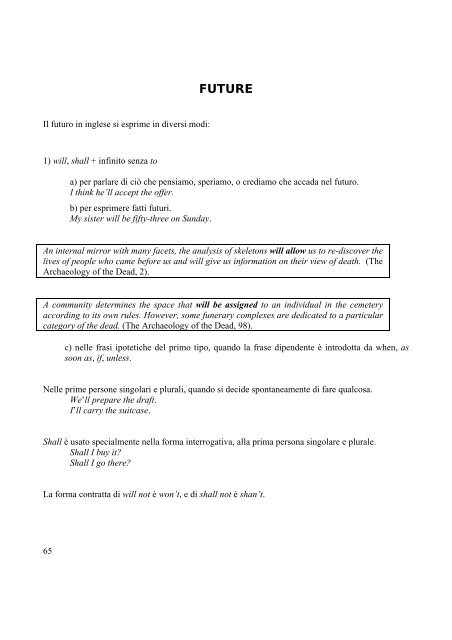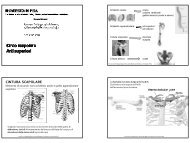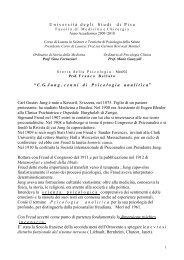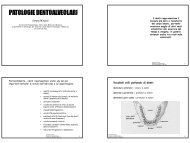Fondamenti della lingua inglese Laura Cignoni - Paleopatologia
Fondamenti della lingua inglese Laura Cignoni - Paleopatologia
Fondamenti della lingua inglese Laura Cignoni - Paleopatologia
You also want an ePaper? Increase the reach of your titles
YUMPU automatically turns print PDFs into web optimized ePapers that Google loves.
Il futuro in <strong>inglese</strong> si esprime in diversi modi:<br />
1) will, shall + infinito senza to<br />
65<br />
FUTURE<br />
a) per parlare di ciò che pensiamo, speriamo, o crediamo che accada nel futuro.<br />
I think he’ll accept the offer.<br />
b) per esprimere fatti futuri.<br />
My sister will be fifty-three on Sunday.<br />
An internal mirror with many facets, the analysis of skeletons will allow us to re-discover the<br />
lives of people who came before us and will give us information on their view of death. (The<br />
Archaeology of the Dead, 2).<br />
A community determines the space that will be assigned to an individual in the cemetery<br />
according to its own rules. However, some funerary complexes are dedicated to a particular<br />
category of the dead. (The Archaeology of the Dead, 98).<br />
c) nelle frasi ipotetiche del primo tipo, quando la frase dipendente è introdotta da when, as<br />
soon as, if, unless.<br />
Nelle prime persone singolari e plurali, quando si decide spontaneamente di fare qualcosa.<br />
We’ll prepare the draft.<br />
I’ll carry the suitcase.<br />
Shall è usato specialmente nella forma interrogativa, alla prima persona singolare e plurale.<br />
Shall I buy it?<br />
Shall I go there?<br />
La forma contratta di will not è won’t, e di shall not è shan’t.
















